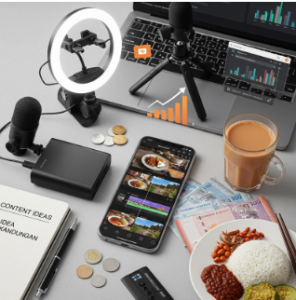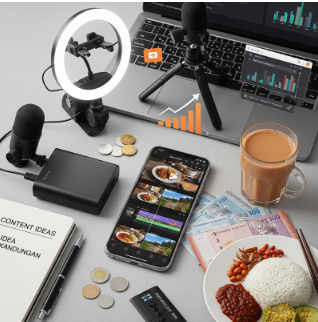Introduction
It used to be that games were for fun and apps were for function. In Malaysia, that line has disappeared.
From e-wallet cashback spins to fitness badges and language-learning streaks, gamification has crept into daily life — transforming ordinary apps into interactive experiences.
The result? A digital culture that’s not just connected, but motivated.
1. Play as Motivation
People love to win — even if the prize is just a digital badge. That simple human impulse fuels Malaysia’s booming gamification scene.
E-commerce platforms reward buyers with lucky spins and seasonal challenges. Fitness apps turn daily steps into points and leaderboards. Learning platforms use streaks, levels, and sound effects to keep students logging in.
It’s proof that motivation isn’t about money — it’s about momentum.
2. Local Platforms Leading the Trend
While global giants like Duolingo popularized game-based learning, Malaysian developers have given it local flavor.
- Fintech apps introduce mini-games tied to spending goals.
- Food-delivery services add “streak rewards” for weekly orders.
- Even government e-services experiment with progress bars and milestones to keep citizens engaged.
This localized creativity shows how fun can coexist with function.
3. Why Gamification Works So Well Here
Malaysia’s digital audience is young, multilingual, and socially connected. We love sharing progress — whether it’s a workout badge or a cashback win.
Gamification fits perfectly with that culture of instant sharing. When users post achievements, they indirectly promote the brand. The app becomes more than a tool; it becomes part of conversation.
4. Beyond Fun: Behavioral Science at Work
Behind every spin wheel and XP bar lies data psychology.
Gamified apps apply core behavioral triggers:
- Progress tracking → satisfaction from visible growth.
- Random rewards → dopamine spikes keep curiosity alive.
- Social validation → leaderboards drive friendly competition.
Used ethically, these mechanics build positive habits. Used poorly, they risk addiction — which is why transparency matters more than ever.
5. Responsible Design in the Game Era
As play merges with productivity, Malaysian users are learning to look for balance.
Developers who succeed long-term prioritize responsible play features:
- Optional reminders for time spent.
- Clear data policies for in-app challenges.
- Rewards that encourage healthy behavior, not endless scrolling.
For developers and everyday users alike, understanding the basics of digital hygiene is crucial. A short digital wellness and safety guide can help verify app integrity, check permissions, and maintain device security — essential steps in any gamified world.
6. The Business Impact: Retention > Reach
For brands, gamification isn’t just marketing; it’s strategy.
Retention rates soar when users feel progression — even virtual. A point system or quest chain can make a financial app as engaging as a mobile game.
Malaysian startups are using this tactic to compete with global players, proving that emotional engagement can outperform ad budgets.
7. The Future: Life as a Game Board
As 5G expands and AR tools mature, expect life itself to get gamified.
- AR shopping hunts in malls.
- Eco-point systems for sustainable actions.
- Hybrid loyalty programs that reward both online and offline behavior.
The next big Malaysian tech success might not be a traditional app — but a lifestyle ecosystem where progress feels like play.
Conclusion
Gamification in Malaysia isn’t a gimmick; it’s a reflection of who we are — social, curious, and driven by reward. From productivity to payments, play now powers participation.
And as long as developers balance excitement with ethics, the future of Malaysian tech will be as enjoyable as it is innovative.

